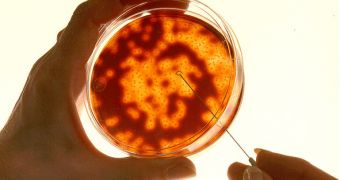Several researchers keep warning us about a climate change-induced global food crisis, so the news that a so-called test-tube burger has recently been rolled out by a team of scientists in the Netherlands is bound to be a head turner.
Dr. Mark and his fellow researchers maintain that, all things considered, their in-vitro meat might soon become a run-off-the-mill food source.
Still, some might say that, in order for this to happen, one such burger will need to be a tad cheaper than the $325,000 (€250,000) it currently costs. The Verge reports that, in order to piece together this laboratory-made burger, the specialists started off by collecting bovine stem cells from the neck of a slaughterhouse cow.
Since these cells can pretty much become whatever types of cells the researchers want them to, techniques used to create organs allowed the Netherlands scientists to compel them into becoming muscle cells.
According to the same source, said techniques made it possible for the researchers to roll out a total of 20,000 strips of laboratory-made bovine muscle tissue.
The combined weight of the tissue is said to have been around a quarter of a pound (about 0.11 kilograms).
It was these muscle strips that were used to make the test-tube burger.
Thanks to its being made from cultured muscle tissue alone, the $325,000 burger has no fat, hence its being rather healthy to eat.
The specialists who worked on this project explain that, as far as they can tell, technological advances will soon turn the practice of creating in-vitro meat into a significantly less costly one.
Still, succeeding in lowering the costs of producing this type of meat only solves half the problem.
Thus, consumers need come to terms with the fact that eating it does not constitute a threat to their health and that doing so might actually be the right thing to do.

 14 DAY TRIAL //
14 DAY TRIAL //